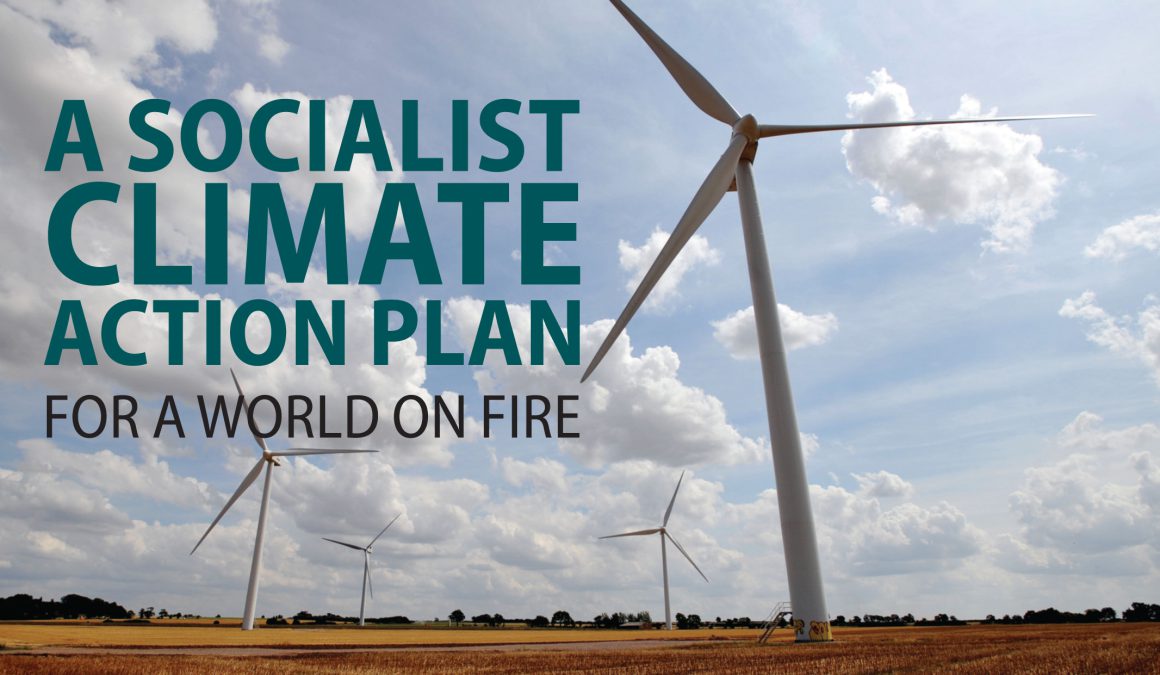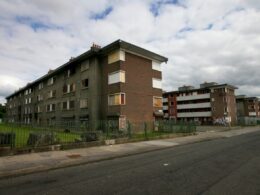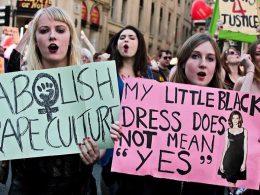Introduction
We face the biggest threat to humanity in history. It is beyond all doubt, as reaffirmed by the latest IPCC report, that we are in the throes of a devastating existential climate and ecological crisis, caused by human activity — or more accurately, human activity as it functions under the capitalist market system.
It is warmer now than it has been for 100,000 years. Since 2000 we’ve experienced 19 of the hottest years since records began 141 years ago.1 At the same time, climate-related extreme weather disasters have jumped by 83% globally in the last 20 years, killing 1.23 million people. Major floods have doubled and severe storms have increased by 40%.2
Everywhere we can see the signs of an accelerating crisis. This summer floods devastated much of central Europe. Wildfires raged from Greece and Turkey to western US and Canada where an unbearable heat wave killed hundreds. These were dwarfed by the infernos sweeping Siberia, which were larger than all the world’s other blazes combined.
In Madagascar hundreds of thousands are facing famine conditions following the worst droughts in decades. As the UN World Food Programme states: “This is not because of war or conflict, this is because of climate change.”
Pandemics, like the coronavirus pandemic which at the time of writing has claimed the lives of over 4.7 million people, are also a product of climate and ecological breakdown, forcing pathogens to evolve and break out into human populations as governments and corporations encroach into undisturbed habitats.
These disasters are harbingers of a far more catastrophic future we can expect if we fail to stem the warming of the planet. This is indeed a terrifying prospect, all the more so because experience of the inaction of ‘world leaders’ in the face of this threat would suggest that it’s more likely than not to come to pass.
Despair would be an understandable reaction, but the wrong one. It’s not too late to act to prevent climate catastrophe, and it can be done. If human activity is causing this crisis, then human activity can likewise stop it: by changing — in sweeping, far-reaching ways, to be sure. But there’s no time to lose.
Here, we offer a programme of action for the climate crisis in Ireland, which must be linked to similar but tailored programmes in every country. As we explain, the fundamental cause of the crisis is the capitalist system, and so this is an anti-capitalist programme for socialist transformation. Nothing less will do. If ever revolutionary change was called for it is now.
Disastrous inaction, devastating action
No matter how many summits they hold or statements they issue, the rulers of our world are utterly failing to act to avert this disaster. More than half of the CO2 emissions since 1750 have been produced since 1990; the year of the first IPCC report.3 The fossil fuel companies responsible for more than half of those emissions have spent billions on propagating misinformation and bogus science to cover up their damaging actions.4
The world’s governments have known and have allowed it to happen. Their failure is due to their acceptance of the capitalist system, with its recurring crises and prioritisation of short-term profit. It’s an inherently anarchic and destructive system, and can’t be any other way.
The abject failure of market-based solutions is evident in the fact that while every energy company now issues propaganda boasting of its green credentials (while lobbying against climate action), only 2% of the world’s energy currently comes from wind and solar power.5 Private investment in renewables has actually gone into decline since 2016.6 Meanwhile, fossil fuel supply has continued to expand, including with the boom in fracked gas. Since the Paris Climate Agreement in 2015, the world’s 60 largest banks have invested $3.8 trillion in fossil fuel companies.7
This is not merely ‘’inaction’’ but the active wrecking of our planet. They will not stop. They will continue to extract and burn fossil fuels as long as it is profitable, or until a movement can be built which can stop them.
The system is the problem
The capitalist system we live under is in direct conflict with the future of our world. In this system, the key economic sectors and sources of wealth are owned and controlled by a wealthy minority, and profit-making is the overriding factor which drives economic activity. Competition with rival capitalists creates a dynamic in which all other considerations are necessarily relegated to the need for short-term profit, to re-invest and expand, lest they go bust or be swallowed up.
The control of the capitalist class over the economy naturally means huge power over governments, state institutions and the media, all of which reflect their influence and interests.
In such a system, nature is treated as an inexhaustible source of wealth which can be freely exploited. The costs and consequences of depleting natural resources, polluting ecosystems, and disrupting the processes integral to maintaining the biosphere will never be included in this profit-making formula.
The reality is that all wealth comes from the raw resources of the earth and the work done with them by workers. According to a recent UN-sponsored report, none of the world’s main industries would actually be profitable if they had to pay the costs of their environmental damage.8 Living sustainably is fundamentally contradictory to capitalism’s constant need to expand and to maximize profits.
Green capitalism bankrupt
Anyone looking for confirmation of the bankruptcy of ‘’green’’ capitalism should look no further than the role of the Green Party in government in the South. During its first stint in government with Fianna Fáil in 2007, it rubber stamped the bank bailout and every austerity measure, and failed to gain any significant environmental measures. It betrayed the community-led protests in Rossport, Co. Mayo, against Shell’s Corrib gas pipeline which it had supported in opposition. Eamon Ryan, as minister for Communications, Energy and Natural Resources, initiated a particularly woeful scheme that incentivised the purchase of diesel engine cars.
The Greens’ participation in the current Fianna Fáil-Fine Gael coalition has likewise not meant the introduction of radical measures; no free public transport, no mass investment in energy-efficient housing, no plans for a green transition in agriculture, which is the biggest contributor to Ireland’s carbon emissions. Its exalted Climate Action Bill amounts to a thoroughly inadequate target of achieving carbon neutrality by 2050, a target which this and future governments will only be legally bound to “pursue”. Instead, working-class people are being made to pay with increased carbon taxes while the key polluting sectors of big business are protected.
Under this government we are seeing a boom in data centres, owned by multinationals like Facebook, Google and Amazon. Many of these centres use as much water as large Irish towns. By 2030, it is projected they will have added 1.5 million tonnes to the state’s carbon emissions and consume 30% of its electricity use. This figure could increase to 70% if all the proposed data centres were to be facilitated.9
Agriculture, mainly big agribusiness, contributes around 33% of Ireland’s carbon emissions and the Green Party accepted last minute amendments to its already weak Climate Action Bill which protected this industry. Pro-capitalist ‘environmentalism’ cannot take on the interests of the multinationals which dominate the southern economy, or of Irish capitalists like billionaire Larry Goodman and the other ‘beef barons’.
The picture in the North is no different. Alongside many climate change deniers in the DUP we have gross hypocrisy from the rest of the main parties. All the parties (with the exception of the DUP which has proposed an alternative bill that is even ‘less ambitious’) have supported a Climate Bill that commits to carbon neutrality by 2045.
While they are happy to have their pictures taken campaigning for this bill, they support toxic industries operating in the North. While community protests have stopped attempts at fracking, there is still no official ban, and the threat from unwanted oil and gas companies remains. The Northern Ireland Executive has even commissioned a £75,000 consultants’ report on the pros and cons of petroleum exploration. Likewise, tens of thousands of people have objected to gold mining in the Sperrin mountains, yet all Stormont has committed to is a ‘public inquiry’ on the issue.
Who’s to blame?
We must be clear — climate change is not a ‘crime of humanity’, it is a crime against humanity, as well as against the earth. We reject the argument that ‘’we are all to blame’’. The vast majority of the world’s population is responsible for very little in terms of carbon emissions. A recent UN report showed that globally the top 1% of earners are responsible for a yearly per capita average of 74 tons of C02 per year. Meanwhile for the bottom 50% of earners the figure is 0.7 tons.10 The poorest half of the world are responsible for just 7% of cumulative emissions since 1990, while the richest 10% are responsible for 52%, and the richest 1% for 15%.11
In fact, as the US folk singer and labour organiser Utah Phillips put it: “The earth is not dying, it is being killed, and those who are killing it have names and addresses.” The culprits responsible for the harm being done to our planet are the super-wealthy people that make up the capitalist class and their hangers on.
For example, the CEOs and boards of the major corporations and banks make decisions every day that profoundly shape our world. They are unaccountable, and operate by one ultimate guiding principle: to maximise profit. This combination of unlimited power and insatiable greed is the source of the environmental crisis, and countless others besides.
We reject, too, the argument that living standards are too high and working-class people must pay for the crisis in the form of regressive measures like carbon taxes, water charges, etc. Many, even in wealthier countries, are not ‘’over consuming’’, rather they do not even have secure access to adequate housing, healthcare or other basics. Any neo-liberal ‘’environmental’’ policies which add to the pressure people are under will only drive a wedge between the climate movement and working-class people.
Instead, we stand for a mass, united movement of working-class and young people to take on the corporations and politicians who are destroying our world.
Public ownership and democratic planning
Of course there are endless examples of waste and unsustainable consumption. But these are not primarily the result of individual choices but of the system we live under. Supermarkets and agribusiness dump good food while millions around the world go hungry. ‘Planned Obsolescence’ means that products are deliberately built not to last.
Huge resources are wasted on unnecessary packaging, on advertising, on duplication by competing companies. Such is the irrationality of capitalist economy that there are 68 varieties of Irish apples, which can be grown and stored here throughout most of the year, and yet 95% of the €100 million worth of apples consumed here each year are imported, from countries such as New Zealand, Chile and South Africa.12 This is no accident.
How can we have rational production and consumption when the whole economy is geared primarily to make profit for a tiny elite? We need to organise things on a completely different basis; an economy geared to fulfilling human needs and to making the urgent transition to a sustainable relationship with our environment.
We can only do this if the economy is owned and controlled not by the banks, the energy companies and the other capitalist profiteers but planned democratically by working people, in Ireland and around the world. Rather than the competition, chaos and self-interest of the capitalist market, a democratically planned economy will facilitate purposeful, targeted and coordinated action to address this crisis. This could involve a global plan to completely transform energy, transport, infrastructure, industry and agriculture on the basis of renewable energy and of sustainability.
Such a programme will not mean a threat to workers or to jobs, but would instead mean massive investment in green and low-carbon jobs. We need a new green industrial sector under democratic public ownership producing the renewable energy infrastructure we need. We need to build and staff new transport networks and to retrofit every home and building. We also need to invest in quality housing, in health, in education and in many other basic needs.
Such a programme could guarantee the future of every worker in the high-carbon industries which will need to be reduced or ended. It is capitalism and its market anarchy which condemns workers and young people to mass unemployment while there is essential work that’s not being done because it is not sufficiently profitable for the bosses. Socialism would harness all of the human and technological resources at our disposal, and gear them towards solving society’s problems.
The fight of our lives
But this kind of policy will not be given from on high. In recent years, an international protest movement of millions of young people has been a real point of pressure on governments. This has been hugely positive and points to the only way forward for the climate movement; independent action from below. But so far it hasn’t been enough to force the fundamental changes needed.
In fact no significant measures have been taken despite the increasingly dire warnings from scientists, only very limited “voluntary” and “nationally decided” climate commitments. At the same time carbon emissions continue to reach record highs.
Whatever shifts may now take place in the ruling class’ approach as the crisis develops, the constraints of this rotten system mean that they will never implement the measures needed. The rivalries between capitalist nation-states mean that the different powers will seek to maintain their own ‘’competitive advantage’’ by minimising the action they take. Fossil fuel interests, the agricultural industry, other major polluters and their loyal politicians will work tenaciously to block a transition to a sustainable future.
Planning on an unprecedented scale, production for human need and international cooperation — these are the key approaches we need if we are to rescue ourselves from the looming climate catastrophe.
Our rulers and their system will not deliver the ecological transition we need and so the fight for climate action is now an urgent fight to take power from their hands and transform society. The climate movement needs a revolutionary socialist programme and real democratic organisation — in every workplace, community, school and college. It will be led by young people, but to win it needs to be a global movement of the working class, which is the force which makes everything in society function and has the strength to really challenge capitalist power.
‘Socialism or barbarism’ wrote Rosa Luxemburg in 1916. This choice is now starker than ever. We face a terrifying future unless we can organise to replace capitalism with a democratic socialist system, where the key sectors of the economy are planned to meet the needs of all people and the environment.
In this society, economic decisions would necessarily factor in environmental and social impact. On the basis of a truly democratically-run economy, we could make rapid decisions about how to use the resources of society and put the full weight of the global working class behind stopping runaway climate change in its tracks.
Winning this society will require the biggest ever united struggle of the global working class against capitalism. While the size of this task is mammoth, it is absolutely realisable and the future of humanity depends on it. Below are some key aspects of the Socialist Party’s programme to fight the climate crisis and capitalism — join us today.
A 10-point climate action plan:
1) Urgent action to stop the pollution
We need immediate, radical action. Both the Irish and UK governments have endorsed the call to be net-zero by 2050. This is too late, as by this point there will already be enough carbon in the atmosphere to catastrophically alter the Earth system. Not only this, but these pledges come with no actual plans of how this can be achieved.
We need an immediate end to all deforestation, chemical pollution and a ban on toxic mining for precious metals. We also need decisive action to reduce industrial greenhouse gas emissions which continue to rise in Ireland. This includes halting all oil and gas extraction and exploration in the fields off the Irish coast — all licenses for which should be deemed null and void.
End all state subsidies and investments in fossil fuel projects. We need to ban the import of fracked gas and plans for liquified natural gas terminals should be scrapped. Through substantial public programmes of forest and bog restoration, biodiversity can be protected and carbon sequestered.
2) No to “eco-capitalism” & “eco-austerity”
While big business now cynically promotes a green image, it is fundamentally driving this crisis, not solving it. If we are to win a real transition to a sustainable system it means challenging the big corporations harming the planet, as well as the banks and hedge funds that invest in them and the governments that allow them to continue destroying the earth.
We oppose ‘’eco-austerity’’ measures like water charges and regressive carbon taxes. These are attempts to pass the blame and the cost of the crisis onto working-class people, and will not curb emissions or waste. Eco-austerity is no solution to a crisis that begins with capitalist production itself.
Tax the super-rich, end corporate welfare and nationalise the banks. Use the wealth to fund large-scale emergency investments in green energy and technology, and a mass green jobs programme.
3) Green energy now
70% of electricity in the South is still powered by fossil fuels; this is scandalous. We need a rapid and expansive transition to green energy, primarily wind and solar power. Nuclear power and biomass energy are damaging in numerous ways and are not part of the solution.
Establish a publicly-owned green energy company, run by elected representatives of workers in that sector, other sectors, and communities, to manufacture, install and operate wind turbines, including on major off-shore and on-shore wind-farms. Similarly, to manufacture wave and tidal turbines, and solar panels to be installed on most houses and buildings.
Importantly, these projects should be carried out in consultation with communities and without further clearing of and encroaching into areas which are vital wildlife habitats and sources of irreplaceable biodiversity.
Rebuild electric grids so that they rely entirely on renewable energy, with smart grid technology to integrate vast energy sources, and linked to international projects of supergrid networks.
Environmentally damaging industries should be nationalised under workers’ control and redesigned and retooled to contribute to the climate emergency, or other social issues. We also need a moratorium on the building of data centres, which are an untenable drain on our energy supplies.
4) Transform agriculture
Agriculture is the biggest factor in CO2 emissions in Ireland, responsible for around one third.
We need to transform our food systems away from big agribusiness’ intensive agricultural and land-use practices, which pose threats both to environmental and public health. Workers for agribusiness companies are routinely forced to work in unsafe conditions — this was highlighted when multiple meatplants saw Covid-19 outbreaks.
The large corporations that harm our environment and our food-systems should be brought under democratic public ownership. The workers involved in these industries and the public more generally should be in control of the food that we depend on, not the corporations that just seek to maximise their profits no matter the harm to animals and the planet.
Small and medium farmers should be supported to move to sustainable practices and technologies, providing for training in regenerative farming practices and income support.
Part of any ecological transition in farming must be ending the dominance of meat and dairy, which is such a big contributor to carbon emissions. On the basis of democratic planning, this can be done in a way which protects the livelihoods of small and medium farmers and agricultural workers.
5) Free, reliable & expanded public transport
Public transport in Ireland is currently underfunded and unreliable. We need massive investment in free, reliable and expanded public transport to transform our cities, towns and communities.
As well as abolishing fares, we need a vast improvement in quality and quantity: an integrated public transport system based on trains, trams, buses and bicycles. No-one in a city or town should live or work more than a five-minute walk from public transport links, with frequent services.
School buses should cover all public schools and be completely free of charge. Not only will this reduce emissions, but it will massively improve people’s lives through increased connectivity and public space, reducing traffic and stress for commuters.
With such a public transport system, personal car use will dramatically decrease, but infrastructure for electric vehicles, powered by renewables, should be put in place to allow for a total phase out of petrol and diesel engines.
6) A real just transition: public works & green jobs
A Socialist Climate Action Plan would implement a massive green jobs and public works programme that builds new green industries, carries out the transition to 100% renewable energy and a sustainable economy.
Introduce a living wage and a four-day working week with no loss in pay — to share out work, improve productivity and mental health, and reduce commuter carbon. A shorter working week will also crucially give workers more time to participate in other activities, including climate activism.
A state-owned construction company must be set up to build hundreds of thousands of public homes, and the schools, hospitals, creches, community centres and amenities needed to go with them; all built to the highest standards of energy efficiency. On top of this, where necessary, all existing homes and public and commercial buildings should be retrofitted to meet the same standards.
All public services should be brought back into full public ownership, such as waste collection and recycling, water provision etc. Major investment is needed in building, repairing and upgrading water treatment plants, wastewater treatment plants, water and sewer networks.
Significantly expand national parks, and commence an extensive reforestation and afforestation programme, with proper full-time jobs in planting and maintaining forests as well as sustainable forestry.
We also need to plan the adaptation of our societies to the unfolding impacts of climate change, including protection against extreme weather events, flood defences in particular, and ecological clean-up measures.
Not one worker should lose out. The only real ‘just transition’ is one where workers are at the centre of decision making: where they control their workplaces, communities and the economy as a whole.
7) Build a fighting climate movement
The school and college strikes have shown that the younger generations will lead the way in this struggle. Build on and extend the strike movement to workplaces where they can really impact the ‘business as usual’ operation of the capitalist economy.
Working people not only suffer the worst effects of climate change, but also have enormous power when they organise and act together. Workers make society run – everywhere from schools to transport to factories – and by striking can bring this system to a halt.
Organise a mass campaign network of grassroots climate committees in schools, colleges, workplaces and local communities. Trade unions and students unions should also be part of such a network. Bureaucratic union leaderships have a history of blocking struggle, so the movement should base itself on appealing to and organising rank and file workers and union members.
All effective campaigning tactics should be utilised, from petitions, protests, boycotts, to walkouts, occupations and of course strikes of varying durations and intensity. A crucial objective should be to build the campaign by winning over as many people as possible. The movement for climate action should support and link with all struggles by working-class people against inequality and oppression of every kind.
The targets should be the capitalist governments and the major polluters and wealth hoarders. The movement for climate action has no real allies in the capitalist ruling class, only opponents.
Only by basing itself on the methods of social and workers’ struggle can it effectively fight for the real changes needed. Reforms can be wrenched even from right-wing governments, but the climate movement needs to build its own political alternative; to bring about socialist governments that will implement the necessary anti-capitalist policies.
8) Democratic planning not market chaos
The challenges we face are of world-historic proportions. Nothing comparable to what’s needed, in scale or timeframe, has ever been undertaken let alone accomplished. The type of root and branch transformation — of production, distribution, consumption, energy, travel — required to achieve a truly sustainable world would be nothing short of revolutionary.
It is inconceivable that the capitalist market could bring about this change. The essential interventions by states in response to the coronavirus pandemic demonstrated in practice that even ardent free market ideologues must ditch their principles in response to such an emergency, and the climate crisis is a global emergency of a considerably greater magnitude. However even these state interventions were extremely limited and only temporary, precisely due to capitalist ideology, which is prepared to allow millions to suffer and die from the virus rather than impede profit making, by big pharma for example.
The technology, knowledge and ingenuity exists to transition to a carbon-free economy, but only if these — and all resources — are utilised in a planned and democratic way, with equality and justice as cornerstones.
We can’t control what we don’t own, so we need to take the key sectors of the economy into public ownership, under democratic workers’ control and management. Under our collective control we can use science and technology in the interest of society and nature, to ensure fast and effective emissions reduction without compromising people’s living standards.
Rational planning can eradicate the waste of capitalist production: end unnecessary duplication and planned obsolescence, make products that last and repair, and reuse natural resources. We can slash expenditure on arms and the mis-information of advertising.
9) Internationalism not imperialist rivalry
Build the movement across all borders — there are no national solutions to this global crisis. The climate crisis is being weaponised by imperialism and the US and China in their great power rivalry. We say no to the new Cold War!
As a result of immense global inequality, poorer countries currently bear the brunt of the climate crisis. To take first steps against this enormous injustice, all foreign debts must be cancelled and patents on crucial technology and knowledge scrapped. Patents and “business secrecy” have been used during the Covid-19 pandemic to protect private profits, causing the deaths of millions, and “vaccine nationalism” has prevented an effective global pandemic response.
Green technology as well as medical and pharmaceutical knowledge and technology must be shared freely between workers in all countries on the basis of international solidarity and cooperation among the working class and poor.
The only plan which can save our planet is one which ends national and inter-imperialist rivalries and co-operates on a global scale. Capitalism and imperialism can never deliver this. It can only be won through coordinated action of the international working class and poor for global revolutionary change, against the capitalist class and the nation states that defend their interests.
10) Fight for socialist change
For many people today it’s ‘easier to imagine the end of the world than the end of capitalism’. Understanding the seriousness of the environmental crisis, and that the reality is likely worse than even the scientists have accounted for, likely reinforces this problem.
The capitalist class has done all it can to foster the notion that ‘there is no alternative’ to capitalism. But it’s no longer just socialists, more and more scientists now argue that anyone who wants to avert climate disaster and build a just and sustainable future, has no alternative but to fight to end the rule of this system and rebuild society on a new basis. For example, the recently leaked draft report of the IPCC Group III states: “the character of economic development produced by the nature of capitalist society is viewed by many political economic critics as ultimately unsustainable.”13
It’s very practical: If 100 companies are responsible for 70% of emissions, their actions in the coming years will determine all of our futures. This is untenable, and why we simply have no alternative but to take these companies out of private hands. Likewise big agribusiness, big retail and big pharma, and all of the major companies that dominate the economy.
Socialism means an economy and society organised around a rational plan to meet human needs sustainably, with real democracy, equality and solidarity at the core.
This is what’s needed, practically speaking, to save the planet. The wealthy elites will always be ardent opponents of this change, and unfortunately, they will never give up their power and privileges voluntarily.
But they can’t stop us — the working-class and oppressed majority. We won’t let them burn the earth for their profits. If workers stop working, the world stops working. Mobilising this power is key to bringing about the change we need. To do this we must get organised and act with urgency.n
The crisis is global and so must our struggle be. The Socialist Party is organised as part of International Socialist Alternative; an organisation of workers and youth actively fighting for socialist change in over 30 countries. If you agree, join us: www.internationalsocialist.net
Notes:
1. NASA, Jan 14 2021, ‘2020 Tied for Warmest Year on Record’, www.nasa.gov
2. Rebecca Green, August 2021 ‘Tipping Point’, Socialist World, Issue 6
3. Thorfinn Stainforth, 29 April 2020, ‘More than half of all CO2 emissions since 1751 emitted in the last 30 years’, Institute for European Environmental Policy, www.ieep.eu
4. Chris McGreal, 30 June 2021, ‘Big oil and gas kept a dirty secret for decades’, The Guardian, www.theguardian.com
5. Jonathan Neale, 2021, Fight the Fire, Resistance Books, p.85
6 Ibid, p.90
7. Eoin Burke-Kennedy, 24 Mar 2021, ‘World’s top 60 banks pump $3.8tn into fossil fuels since Paris accord’, The Irish Times, www.irishtimes.com
8. Films For Action, 22 April 2016, ‘UN Report Finds Almost No Industry Profitable If Environmental Costs Were Included’, www.filmsforaction.org
9. Harry McGee, 28 Sept 2021, ‘Data centres could use 70% of Ireland’s electricity, committee to hear’, The Irish Times, www.irishtimes.com
10. United Nations Environment Programme, 9 Dec 2020, Emissions Gap Report 2020, www.unep.org
11. Oxfam, 21 Sept 2021, Confronting Carbon Inequality: Putting climate justice at the heart of the COVID-19 recovery
12. Michael Kelly, 16 Sept 2017, ‘When was the last time you had an Irish apple? 95% of ones we eat are imported’, www.thejournal.ie
13. J. Bordera, F. Valladares, et al., 23 Aug 2021, www.mronline.org












